ACCT19083: Grameen Bank - Ethics, Governance, and Social Impact
VerifiedAdded on 2023/06/15
|15
|4775
|378
Case Study
AI Summary
This assignment delves into the ethical and governance challenges faced by Grameen Bank, a Nobel-winning microfinance institution. It explores the concept of socially responsible businesses, using Motorola's partnership with the EPA as an example. The assignment analyzes whether Grameen Bank qualifies as a socially responsible enterprise, considering its focus on social welfare over profit maximization. It defines ethical dilemmas and provides a hypothetical example, then examines the ethical issues surrounding accusations of financial impropriety and high interest rates at Grameen Bank, highlighting the conflict between profit motives and public interest. This detailed analysis offers valuable insights into the complexities of ethical decision-making in the context of social banking.
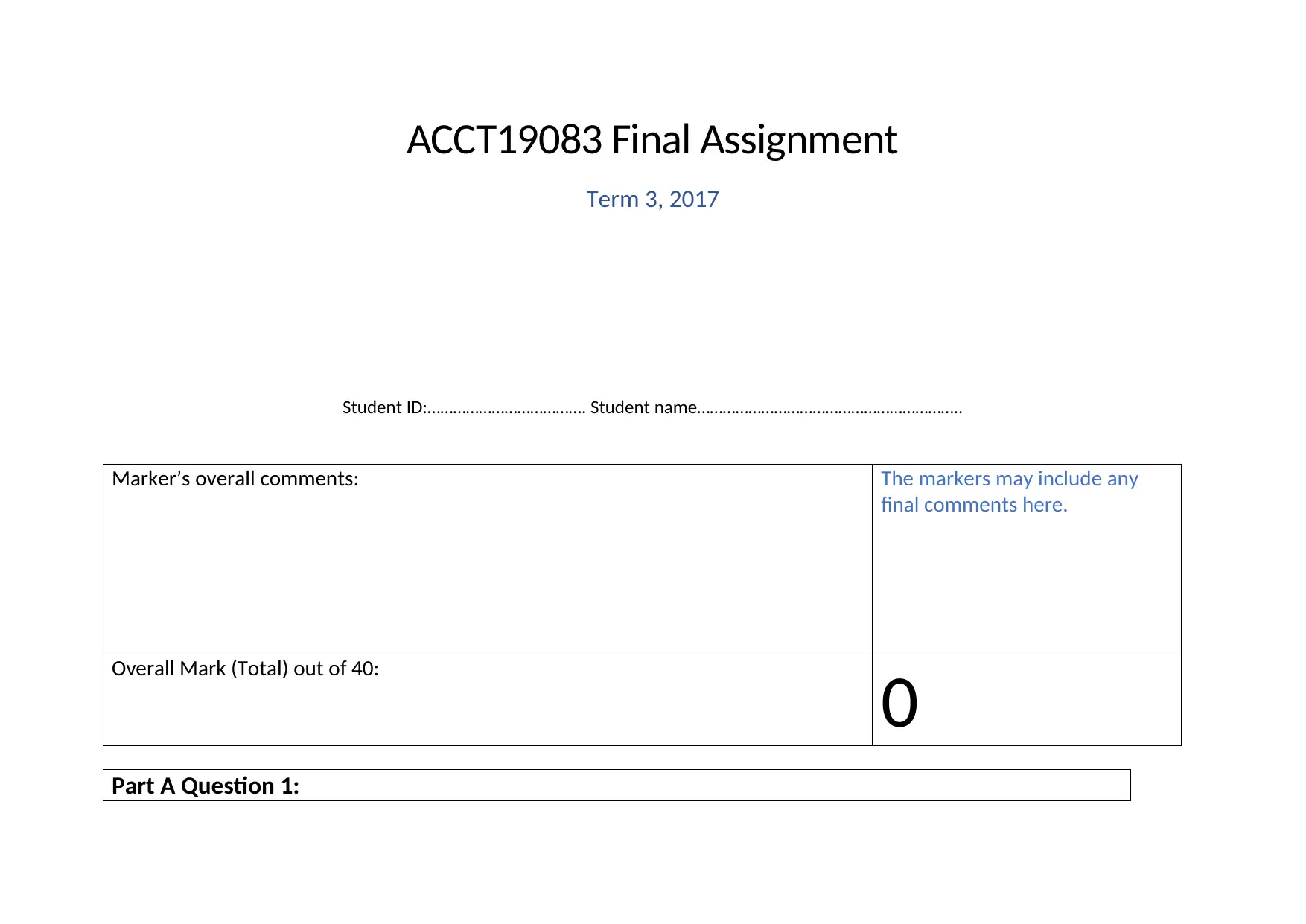
ACCT19083 Final Assignment
Term 3, 2017
Student ID:………………………………. Student name……………………………………………………..
Marker’s overall comments: The markers may include any
final comments here.
Overall Mark (Total) out of 40:
0
Part A Question 1:
Term 3, 2017
Student ID:………………………………. Student name……………………………………………………..
Marker’s overall comments: The markers may include any
final comments here.
Overall Mark (Total) out of 40:
0
Part A Question 1:
Paraphrase This Document
Need a fresh take? Get an instant paraphrase of this document with our AI Paraphraser
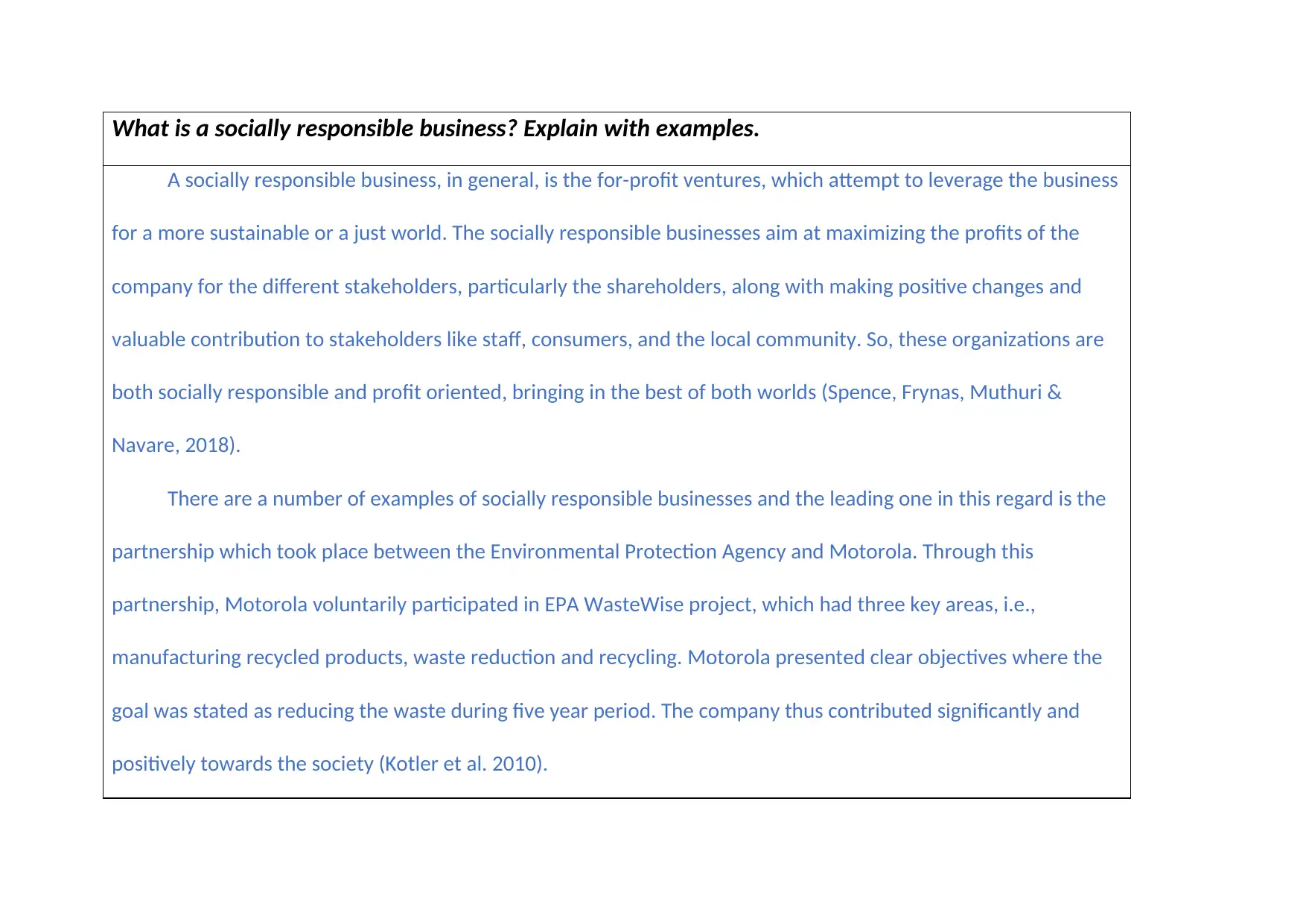
What is a socially responsible business? Explain with examples.
A socially responsible business, in general, is the for-profit ventures, which attempt to leverage the business
for a more sustainable or a just world. The socially responsible businesses aim at maximizing the profits of the
company for the different stakeholders, particularly the shareholders, along with making positive changes and
valuable contribution to stakeholders like staff, consumers, and the local community. So, these organizations are
both socially responsible and profit oriented, bringing in the best of both worlds (Spence, Frynas, Muthuri &
Navare, 2018).
There are a number of examples of socially responsible businesses and the leading one in this regard is the
partnership which took place between the Environmental Protection Agency and Motorola. Through this
partnership, Motorola voluntarily participated in EPA WasteWise project, which had three key areas, i.e.,
manufacturing recycled products, waste reduction and recycling. Motorola presented clear objectives where the
goal was stated as reducing the waste during five year period. The company thus contributed significantly and
positively towards the society (Kotler et al. 2010).
A socially responsible business, in general, is the for-profit ventures, which attempt to leverage the business
for a more sustainable or a just world. The socially responsible businesses aim at maximizing the profits of the
company for the different stakeholders, particularly the shareholders, along with making positive changes and
valuable contribution to stakeholders like staff, consumers, and the local community. So, these organizations are
both socially responsible and profit oriented, bringing in the best of both worlds (Spence, Frynas, Muthuri &
Navare, 2018).
There are a number of examples of socially responsible businesses and the leading one in this regard is the
partnership which took place between the Environmental Protection Agency and Motorola. Through this
partnership, Motorola voluntarily participated in EPA WasteWise project, which had three key areas, i.e.,
manufacturing recycled products, waste reduction and recycling. Motorola presented clear objectives where the
goal was stated as reducing the waste during five year period. The company thus contributed significantly and
positively towards the society (Kotler et al. 2010).
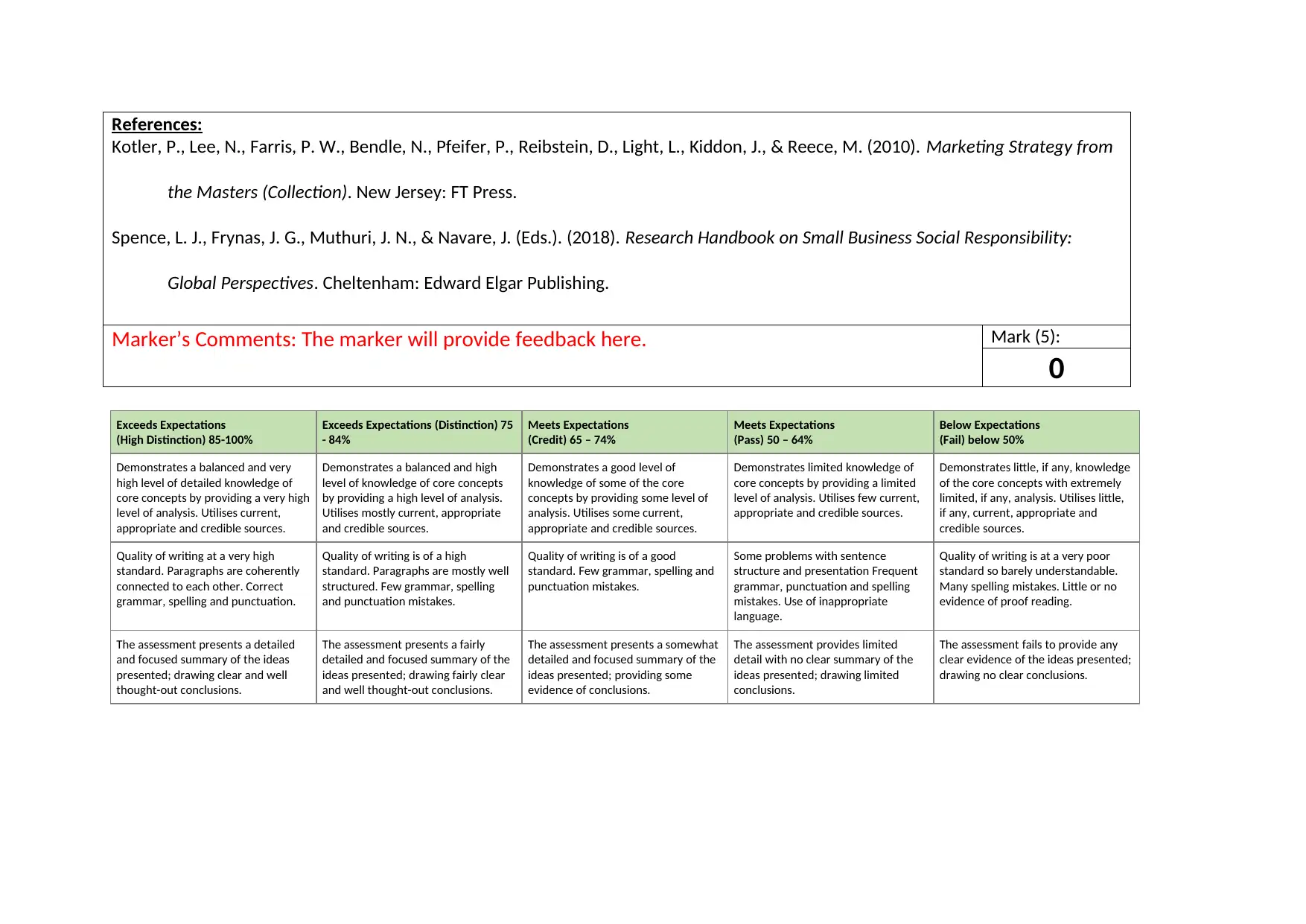
References:
Kotler, P., Lee, N., Farris, P. W., Bendle, N., Pfeifer, P., Reibstein, D., Light, L., Kiddon, J., & Reece, M. (2010). Marketing Strategy from
the Masters (Collection). New Jersey: FT Press.
Spence, L. J., Frynas, J. G., Muthuri, J. N., & Navare, J. (Eds.). (2018). Research Handbook on Small Business Social Responsibility:
Global Perspectives. Cheltenham: Edward Elgar Publishing.
Marker’s Comments: The marker will provide feedback here. Mark (5):
0
Exceeds Expectations
(High Distinction) 85-100%
Exceeds Expectations (Distinction) 75
- 84%
Meets Expectations
(Credit) 65 – 74%
Meets Expectations
(Pass) 50 – 64%
Below Expectations
(Fail) below 50%
Demonstrates a balanced and very
high level of detailed knowledge of
core concepts by providing a very high
level of analysis. Utilises current,
appropriate and credible sources.
Demonstrates a balanced and high
level of knowledge of core concepts
by providing a high level of analysis.
Utilises mostly current, appropriate
and credible sources.
Demonstrates a good level of
knowledge of some of the core
concepts by providing some level of
analysis. Utilises some current,
appropriate and credible sources.
Demonstrates limited knowledge of
core concepts by providing a limited
level of analysis. Utilises few current,
appropriate and credible sources.
Demonstrates little, if any, knowledge
of the core concepts with extremely
limited, if any, analysis. Utilises little,
if any, current, appropriate and
credible sources.
Quality of writing at a very high
standard. Paragraphs are coherently
connected to each other. Correct
grammar, spelling and punctuation.
Quality of writing is of a high
standard. Paragraphs are mostly well
structured. Few grammar, spelling
and punctuation mistakes.
Quality of writing is of a good
standard. Few grammar, spelling and
punctuation mistakes.
Some problems with sentence
structure and presentation Frequent
grammar, punctuation and spelling
mistakes. Use of inappropriate
language.
Quality of writing is at a very poor
standard so barely understandable.
Many spelling mistakes. Little or no
evidence of proof reading.
The assessment presents a detailed
and focused summary of the ideas
presented; drawing clear and well
thought-out conclusions.
The assessment presents a fairly
detailed and focused summary of the
ideas presented; drawing fairly clear
and well thought-out conclusions.
The assessment presents a somewhat
detailed and focused summary of the
ideas presented; providing some
evidence of conclusions.
The assessment provides limited
detail with no clear summary of the
ideas presented; drawing limited
conclusions.
The assessment fails to provide any
clear evidence of the ideas presented;
drawing no clear conclusions.
Kotler, P., Lee, N., Farris, P. W., Bendle, N., Pfeifer, P., Reibstein, D., Light, L., Kiddon, J., & Reece, M. (2010). Marketing Strategy from
the Masters (Collection). New Jersey: FT Press.
Spence, L. J., Frynas, J. G., Muthuri, J. N., & Navare, J. (Eds.). (2018). Research Handbook on Small Business Social Responsibility:
Global Perspectives. Cheltenham: Edward Elgar Publishing.
Marker’s Comments: The marker will provide feedback here. Mark (5):
0
Exceeds Expectations
(High Distinction) 85-100%
Exceeds Expectations (Distinction) 75
- 84%
Meets Expectations
(Credit) 65 – 74%
Meets Expectations
(Pass) 50 – 64%
Below Expectations
(Fail) below 50%
Demonstrates a balanced and very
high level of detailed knowledge of
core concepts by providing a very high
level of analysis. Utilises current,
appropriate and credible sources.
Demonstrates a balanced and high
level of knowledge of core concepts
by providing a high level of analysis.
Utilises mostly current, appropriate
and credible sources.
Demonstrates a good level of
knowledge of some of the core
concepts by providing some level of
analysis. Utilises some current,
appropriate and credible sources.
Demonstrates limited knowledge of
core concepts by providing a limited
level of analysis. Utilises few current,
appropriate and credible sources.
Demonstrates little, if any, knowledge
of the core concepts with extremely
limited, if any, analysis. Utilises little,
if any, current, appropriate and
credible sources.
Quality of writing at a very high
standard. Paragraphs are coherently
connected to each other. Correct
grammar, spelling and punctuation.
Quality of writing is of a high
standard. Paragraphs are mostly well
structured. Few grammar, spelling
and punctuation mistakes.
Quality of writing is of a good
standard. Few grammar, spelling and
punctuation mistakes.
Some problems with sentence
structure and presentation Frequent
grammar, punctuation and spelling
mistakes. Use of inappropriate
language.
Quality of writing is at a very poor
standard so barely understandable.
Many spelling mistakes. Little or no
evidence of proof reading.
The assessment presents a detailed
and focused summary of the ideas
presented; drawing clear and well
thought-out conclusions.
The assessment presents a fairly
detailed and focused summary of the
ideas presented; drawing fairly clear
and well thought-out conclusions.
The assessment presents a somewhat
detailed and focused summary of the
ideas presented; providing some
evidence of conclusions.
The assessment provides limited
detail with no clear summary of the
ideas presented; drawing limited
conclusions.
The assessment fails to provide any
clear evidence of the ideas presented;
drawing no clear conclusions.
⊘ This is a preview!⊘
Do you want full access?
Subscribe today to unlock all pages.

Trusted by 1+ million students worldwide
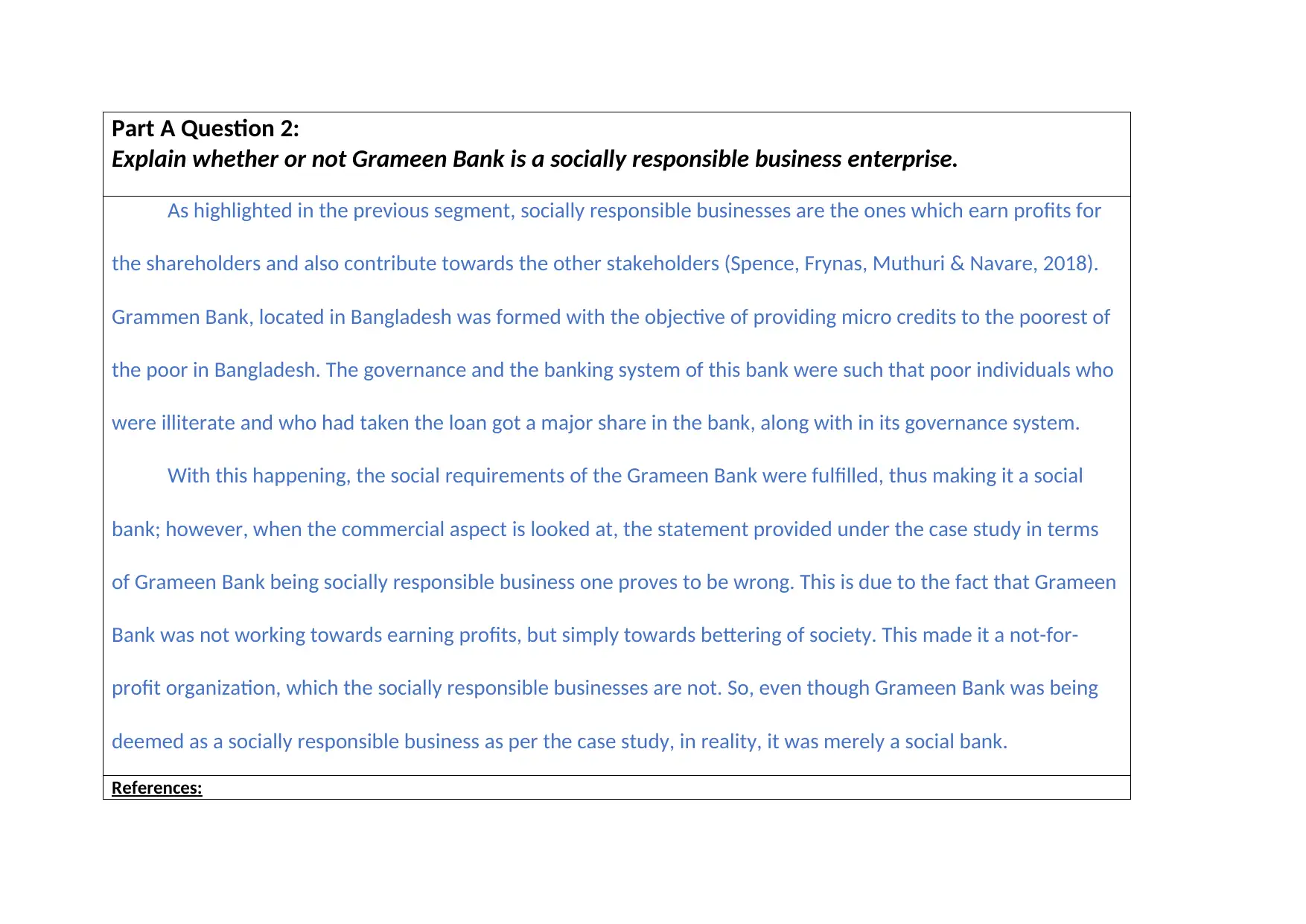
Part A Question 2:
Explain whether or not Grameen Bank is a socially responsible business enterprise.
As highlighted in the previous segment, socially responsible businesses are the ones which earn profits for
the shareholders and also contribute towards the other stakeholders (Spence, Frynas, Muthuri & Navare, 2018).
Grammen Bank, located in Bangladesh was formed with the objective of providing micro credits to the poorest of
the poor in Bangladesh. The governance and the banking system of this bank were such that poor individuals who
were illiterate and who had taken the loan got a major share in the bank, along with in its governance system.
With this happening, the social requirements of the Grameen Bank were fulfilled, thus making it a social
bank; however, when the commercial aspect is looked at, the statement provided under the case study in terms
of Grameen Bank being socially responsible business one proves to be wrong. This is due to the fact that Grameen
Bank was not working towards earning profits, but simply towards bettering of society. This made it a not-for-
profit organization, which the socially responsible businesses are not. So, even though Grameen Bank was being
deemed as a socially responsible business as per the case study, in reality, it was merely a social bank.
References:
Explain whether or not Grameen Bank is a socially responsible business enterprise.
As highlighted in the previous segment, socially responsible businesses are the ones which earn profits for
the shareholders and also contribute towards the other stakeholders (Spence, Frynas, Muthuri & Navare, 2018).
Grammen Bank, located in Bangladesh was formed with the objective of providing micro credits to the poorest of
the poor in Bangladesh. The governance and the banking system of this bank were such that poor individuals who
were illiterate and who had taken the loan got a major share in the bank, along with in its governance system.
With this happening, the social requirements of the Grameen Bank were fulfilled, thus making it a social
bank; however, when the commercial aspect is looked at, the statement provided under the case study in terms
of Grameen Bank being socially responsible business one proves to be wrong. This is due to the fact that Grameen
Bank was not working towards earning profits, but simply towards bettering of society. This made it a not-for-
profit organization, which the socially responsible businesses are not. So, even though Grameen Bank was being
deemed as a socially responsible business as per the case study, in reality, it was merely a social bank.
References:
Paraphrase This Document
Need a fresh take? Get an instant paraphrase of this document with our AI Paraphraser
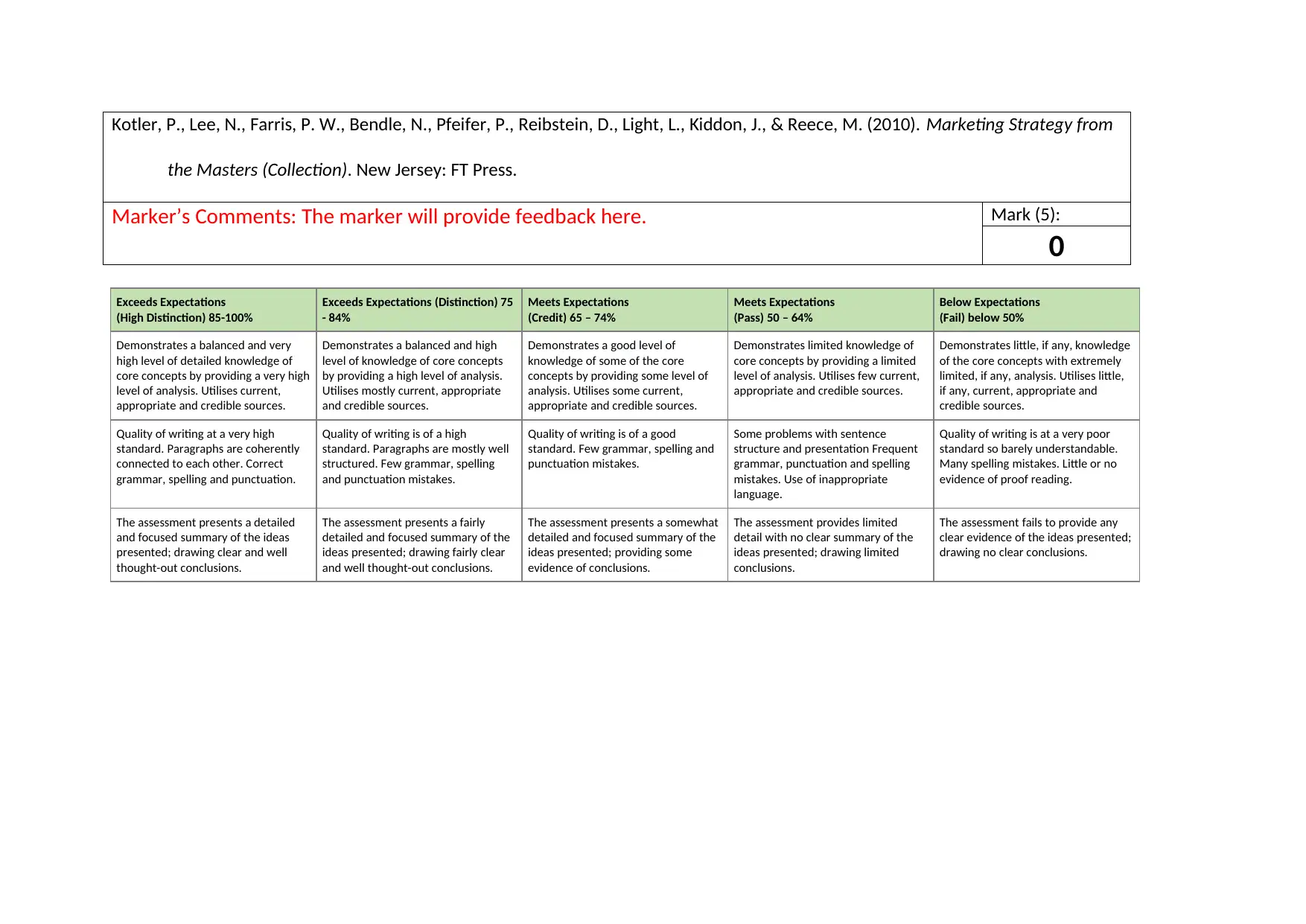
Kotler, P., Lee, N., Farris, P. W., Bendle, N., Pfeifer, P., Reibstein, D., Light, L., Kiddon, J., & Reece, M. (2010). Marketing Strategy from
the Masters (Collection). New Jersey: FT Press.
Marker’s Comments: The marker will provide feedback here. Mark (5):
0
Exceeds Expectations
(High Distinction) 85-100%
Exceeds Expectations (Distinction) 75
- 84%
Meets Expectations
(Credit) 65 – 74%
Meets Expectations
(Pass) 50 – 64%
Below Expectations
(Fail) below 50%
Demonstrates a balanced and very
high level of detailed knowledge of
core concepts by providing a very high
level of analysis. Utilises current,
appropriate and credible sources.
Demonstrates a balanced and high
level of knowledge of core concepts
by providing a high level of analysis.
Utilises mostly current, appropriate
and credible sources.
Demonstrates a good level of
knowledge of some of the core
concepts by providing some level of
analysis. Utilises some current,
appropriate and credible sources.
Demonstrates limited knowledge of
core concepts by providing a limited
level of analysis. Utilises few current,
appropriate and credible sources.
Demonstrates little, if any, knowledge
of the core concepts with extremely
limited, if any, analysis. Utilises little,
if any, current, appropriate and
credible sources.
Quality of writing at a very high
standard. Paragraphs are coherently
connected to each other. Correct
grammar, spelling and punctuation.
Quality of writing is of a high
standard. Paragraphs are mostly well
structured. Few grammar, spelling
and punctuation mistakes.
Quality of writing is of a good
standard. Few grammar, spelling and
punctuation mistakes.
Some problems with sentence
structure and presentation Frequent
grammar, punctuation and spelling
mistakes. Use of inappropriate
language.
Quality of writing is at a very poor
standard so barely understandable.
Many spelling mistakes. Little or no
evidence of proof reading.
The assessment presents a detailed
and focused summary of the ideas
presented; drawing clear and well
thought-out conclusions.
The assessment presents a fairly
detailed and focused summary of the
ideas presented; drawing fairly clear
and well thought-out conclusions.
The assessment presents a somewhat
detailed and focused summary of the
ideas presented; providing some
evidence of conclusions.
The assessment provides limited
detail with no clear summary of the
ideas presented; drawing limited
conclusions.
The assessment fails to provide any
clear evidence of the ideas presented;
drawing no clear conclusions.
the Masters (Collection). New Jersey: FT Press.
Marker’s Comments: The marker will provide feedback here. Mark (5):
0
Exceeds Expectations
(High Distinction) 85-100%
Exceeds Expectations (Distinction) 75
- 84%
Meets Expectations
(Credit) 65 – 74%
Meets Expectations
(Pass) 50 – 64%
Below Expectations
(Fail) below 50%
Demonstrates a balanced and very
high level of detailed knowledge of
core concepts by providing a very high
level of analysis. Utilises current,
appropriate and credible sources.
Demonstrates a balanced and high
level of knowledge of core concepts
by providing a high level of analysis.
Utilises mostly current, appropriate
and credible sources.
Demonstrates a good level of
knowledge of some of the core
concepts by providing some level of
analysis. Utilises some current,
appropriate and credible sources.
Demonstrates limited knowledge of
core concepts by providing a limited
level of analysis. Utilises few current,
appropriate and credible sources.
Demonstrates little, if any, knowledge
of the core concepts with extremely
limited, if any, analysis. Utilises little,
if any, current, appropriate and
credible sources.
Quality of writing at a very high
standard. Paragraphs are coherently
connected to each other. Correct
grammar, spelling and punctuation.
Quality of writing is of a high
standard. Paragraphs are mostly well
structured. Few grammar, spelling
and punctuation mistakes.
Quality of writing is of a good
standard. Few grammar, spelling and
punctuation mistakes.
Some problems with sentence
structure and presentation Frequent
grammar, punctuation and spelling
mistakes. Use of inappropriate
language.
Quality of writing is at a very poor
standard so barely understandable.
Many spelling mistakes. Little or no
evidence of proof reading.
The assessment presents a detailed
and focused summary of the ideas
presented; drawing clear and well
thought-out conclusions.
The assessment presents a fairly
detailed and focused summary of the
ideas presented; drawing fairly clear
and well thought-out conclusions.
The assessment presents a somewhat
detailed and focused summary of the
ideas presented; providing some
evidence of conclusions.
The assessment provides limited
detail with no clear summary of the
ideas presented; drawing limited
conclusions.
The assessment fails to provide any
clear evidence of the ideas presented;
drawing no clear conclusions.
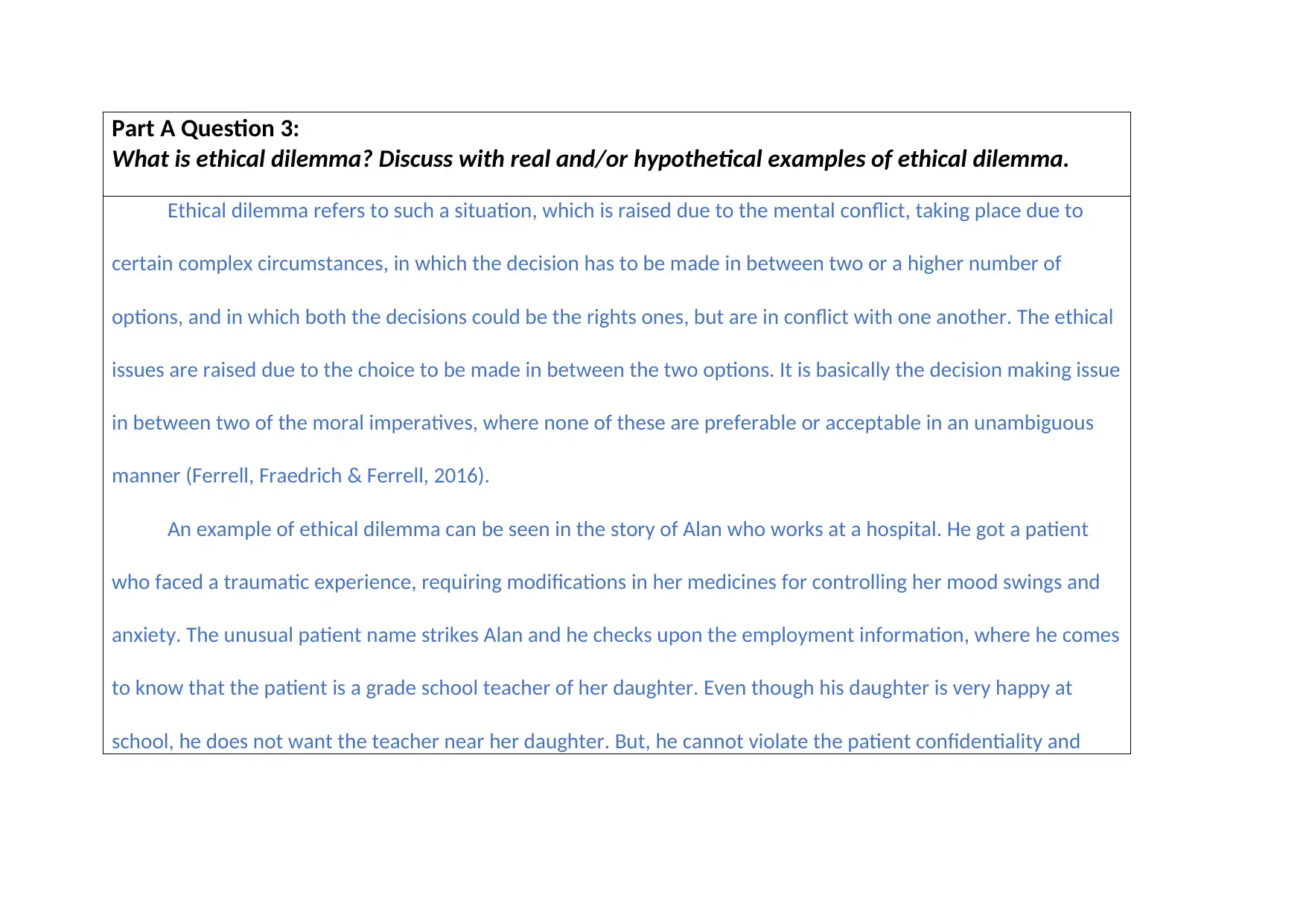
Part A Question 3:
What is ethical dilemma? Discuss with real and/or hypothetical examples of ethical dilemma.
Ethical dilemma refers to such a situation, which is raised due to the mental conflict, taking place due to
certain complex circumstances, in which the decision has to be made in between two or a higher number of
options, and in which both the decisions could be the rights ones, but are in conflict with one another. The ethical
issues are raised due to the choice to be made in between the two options. It is basically the decision making issue
in between two of the moral imperatives, where none of these are preferable or acceptable in an unambiguous
manner (Ferrell, Fraedrich & Ferrell, 2016).
An example of ethical dilemma can be seen in the story of Alan who works at a hospital. He got a patient
who faced a traumatic experience, requiring modifications in her medicines for controlling her mood swings and
anxiety. The unusual patient name strikes Alan and he checks upon the employment information, where he comes
to know that the patient is a grade school teacher of her daughter. Even though his daughter is very happy at
school, he does not want the teacher near her daughter. But, he cannot violate the patient confidentiality and
What is ethical dilemma? Discuss with real and/or hypothetical examples of ethical dilemma.
Ethical dilemma refers to such a situation, which is raised due to the mental conflict, taking place due to
certain complex circumstances, in which the decision has to be made in between two or a higher number of
options, and in which both the decisions could be the rights ones, but are in conflict with one another. The ethical
issues are raised due to the choice to be made in between the two options. It is basically the decision making issue
in between two of the moral imperatives, where none of these are preferable or acceptable in an unambiguous
manner (Ferrell, Fraedrich & Ferrell, 2016).
An example of ethical dilemma can be seen in the story of Alan who works at a hospital. He got a patient
who faced a traumatic experience, requiring modifications in her medicines for controlling her mood swings and
anxiety. The unusual patient name strikes Alan and he checks upon the employment information, where he comes
to know that the patient is a grade school teacher of her daughter. Even though his daughter is very happy at
school, he does not want the teacher near her daughter. But, he cannot violate the patient confidentiality and
⊘ This is a preview!⊘
Do you want full access?
Subscribe today to unlock all pages.

Trusted by 1+ million students worldwide
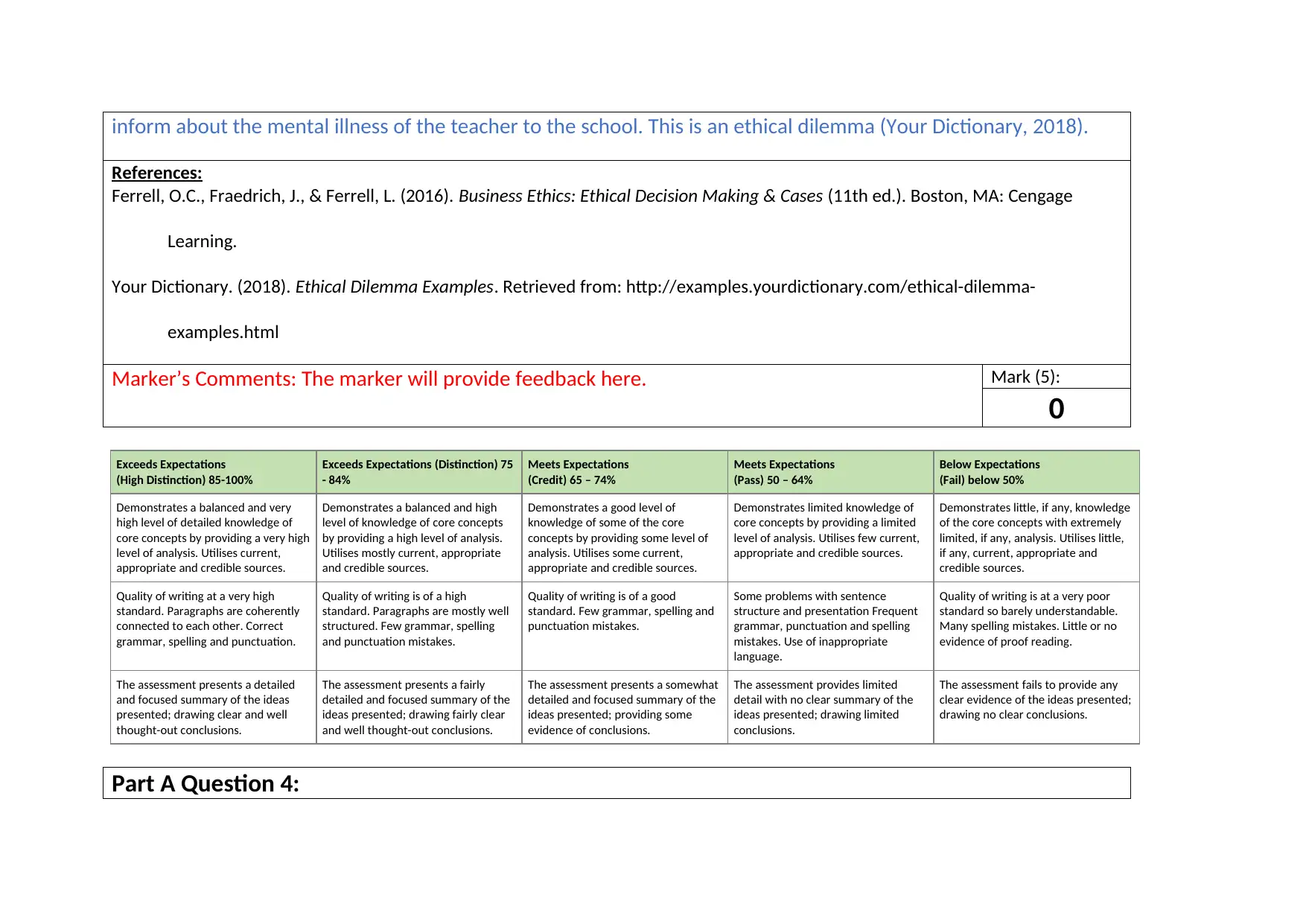
inform about the mental illness of the teacher to the school. This is an ethical dilemma (Your Dictionary, 2018).
References:
Ferrell, O.C., Fraedrich, J., & Ferrell, L. (2016). Business Ethics: Ethical Decision Making & Cases (11th ed.). Boston, MA: Cengage
Learning.
Your Dictionary. (2018). Ethical Dilemma Examples. Retrieved from: http://examples.yourdictionary.com/ethical-dilemma-
examples.html
Marker’s Comments: The marker will provide feedback here. Mark (5):
0
Exceeds Expectations
(High Distinction) 85-100%
Exceeds Expectations (Distinction) 75
- 84%
Meets Expectations
(Credit) 65 – 74%
Meets Expectations
(Pass) 50 – 64%
Below Expectations
(Fail) below 50%
Demonstrates a balanced and very
high level of detailed knowledge of
core concepts by providing a very high
level of analysis. Utilises current,
appropriate and credible sources.
Demonstrates a balanced and high
level of knowledge of core concepts
by providing a high level of analysis.
Utilises mostly current, appropriate
and credible sources.
Demonstrates a good level of
knowledge of some of the core
concepts by providing some level of
analysis. Utilises some current,
appropriate and credible sources.
Demonstrates limited knowledge of
core concepts by providing a limited
level of analysis. Utilises few current,
appropriate and credible sources.
Demonstrates little, if any, knowledge
of the core concepts with extremely
limited, if any, analysis. Utilises little,
if any, current, appropriate and
credible sources.
Quality of writing at a very high
standard. Paragraphs are coherently
connected to each other. Correct
grammar, spelling and punctuation.
Quality of writing is of a high
standard. Paragraphs are mostly well
structured. Few grammar, spelling
and punctuation mistakes.
Quality of writing is of a good
standard. Few grammar, spelling and
punctuation mistakes.
Some problems with sentence
structure and presentation Frequent
grammar, punctuation and spelling
mistakes. Use of inappropriate
language.
Quality of writing is at a very poor
standard so barely understandable.
Many spelling mistakes. Little or no
evidence of proof reading.
The assessment presents a detailed
and focused summary of the ideas
presented; drawing clear and well
thought-out conclusions.
The assessment presents a fairly
detailed and focused summary of the
ideas presented; drawing fairly clear
and well thought-out conclusions.
The assessment presents a somewhat
detailed and focused summary of the
ideas presented; providing some
evidence of conclusions.
The assessment provides limited
detail with no clear summary of the
ideas presented; drawing limited
conclusions.
The assessment fails to provide any
clear evidence of the ideas presented;
drawing no clear conclusions.
Part A Question 4:
References:
Ferrell, O.C., Fraedrich, J., & Ferrell, L. (2016). Business Ethics: Ethical Decision Making & Cases (11th ed.). Boston, MA: Cengage
Learning.
Your Dictionary. (2018). Ethical Dilemma Examples. Retrieved from: http://examples.yourdictionary.com/ethical-dilemma-
examples.html
Marker’s Comments: The marker will provide feedback here. Mark (5):
0
Exceeds Expectations
(High Distinction) 85-100%
Exceeds Expectations (Distinction) 75
- 84%
Meets Expectations
(Credit) 65 – 74%
Meets Expectations
(Pass) 50 – 64%
Below Expectations
(Fail) below 50%
Demonstrates a balanced and very
high level of detailed knowledge of
core concepts by providing a very high
level of analysis. Utilises current,
appropriate and credible sources.
Demonstrates a balanced and high
level of knowledge of core concepts
by providing a high level of analysis.
Utilises mostly current, appropriate
and credible sources.
Demonstrates a good level of
knowledge of some of the core
concepts by providing some level of
analysis. Utilises some current,
appropriate and credible sources.
Demonstrates limited knowledge of
core concepts by providing a limited
level of analysis. Utilises few current,
appropriate and credible sources.
Demonstrates little, if any, knowledge
of the core concepts with extremely
limited, if any, analysis. Utilises little,
if any, current, appropriate and
credible sources.
Quality of writing at a very high
standard. Paragraphs are coherently
connected to each other. Correct
grammar, spelling and punctuation.
Quality of writing is of a high
standard. Paragraphs are mostly well
structured. Few grammar, spelling
and punctuation mistakes.
Quality of writing is of a good
standard. Few grammar, spelling and
punctuation mistakes.
Some problems with sentence
structure and presentation Frequent
grammar, punctuation and spelling
mistakes. Use of inappropriate
language.
Quality of writing is at a very poor
standard so barely understandable.
Many spelling mistakes. Little or no
evidence of proof reading.
The assessment presents a detailed
and focused summary of the ideas
presented; drawing clear and well
thought-out conclusions.
The assessment presents a fairly
detailed and focused summary of the
ideas presented; drawing fairly clear
and well thought-out conclusions.
The assessment presents a somewhat
detailed and focused summary of the
ideas presented; providing some
evidence of conclusions.
The assessment provides limited
detail with no clear summary of the
ideas presented; drawing limited
conclusions.
The assessment fails to provide any
clear evidence of the ideas presented;
drawing no clear conclusions.
Part A Question 4:
Paraphrase This Document
Need a fresh take? Get an instant paraphrase of this document with our AI Paraphraser
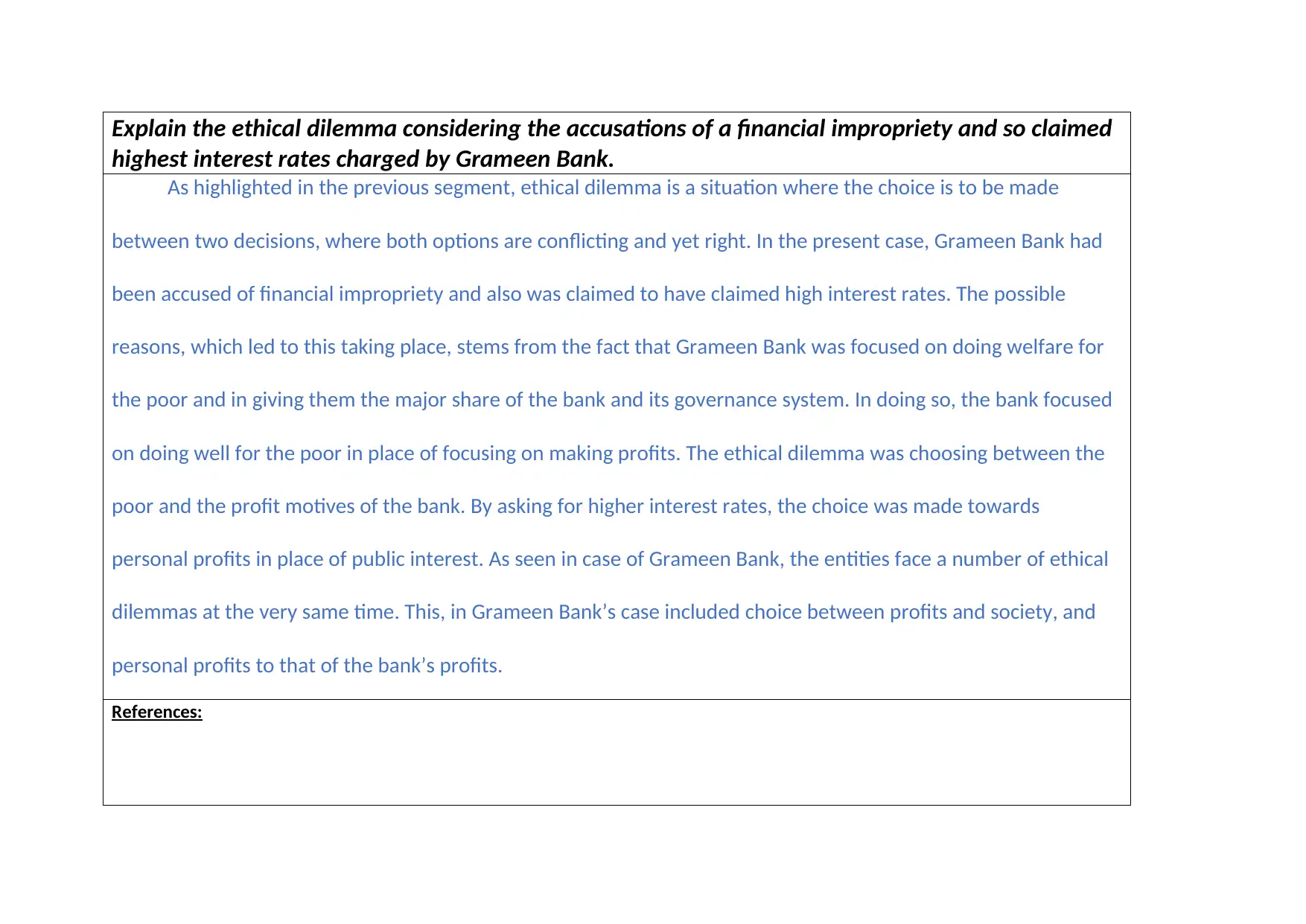
Explain the ethical dilemma considering the accusations of a financial impropriety and so claimed
highest interest rates charged by Grameen Bank.
As highlighted in the previous segment, ethical dilemma is a situation where the choice is to be made
between two decisions, where both options are conflicting and yet right. In the present case, Grameen Bank had
been accused of financial impropriety and also was claimed to have claimed high interest rates. The possible
reasons, which led to this taking place, stems from the fact that Grameen Bank was focused on doing welfare for
the poor and in giving them the major share of the bank and its governance system. In doing so, the bank focused
on doing well for the poor in place of focusing on making profits. The ethical dilemma was choosing between the
poor and the profit motives of the bank. By asking for higher interest rates, the choice was made towards
personal profits in place of public interest. As seen in case of Grameen Bank, the entities face a number of ethical
dilemmas at the very same time. This, in Grameen Bank’s case included choice between profits and society, and
personal profits to that of the bank’s profits.
References:
highest interest rates charged by Grameen Bank.
As highlighted in the previous segment, ethical dilemma is a situation where the choice is to be made
between two decisions, where both options are conflicting and yet right. In the present case, Grameen Bank had
been accused of financial impropriety and also was claimed to have claimed high interest rates. The possible
reasons, which led to this taking place, stems from the fact that Grameen Bank was focused on doing welfare for
the poor and in giving them the major share of the bank and its governance system. In doing so, the bank focused
on doing well for the poor in place of focusing on making profits. The ethical dilemma was choosing between the
poor and the profit motives of the bank. By asking for higher interest rates, the choice was made towards
personal profits in place of public interest. As seen in case of Grameen Bank, the entities face a number of ethical
dilemmas at the very same time. This, in Grameen Bank’s case included choice between profits and society, and
personal profits to that of the bank’s profits.
References:
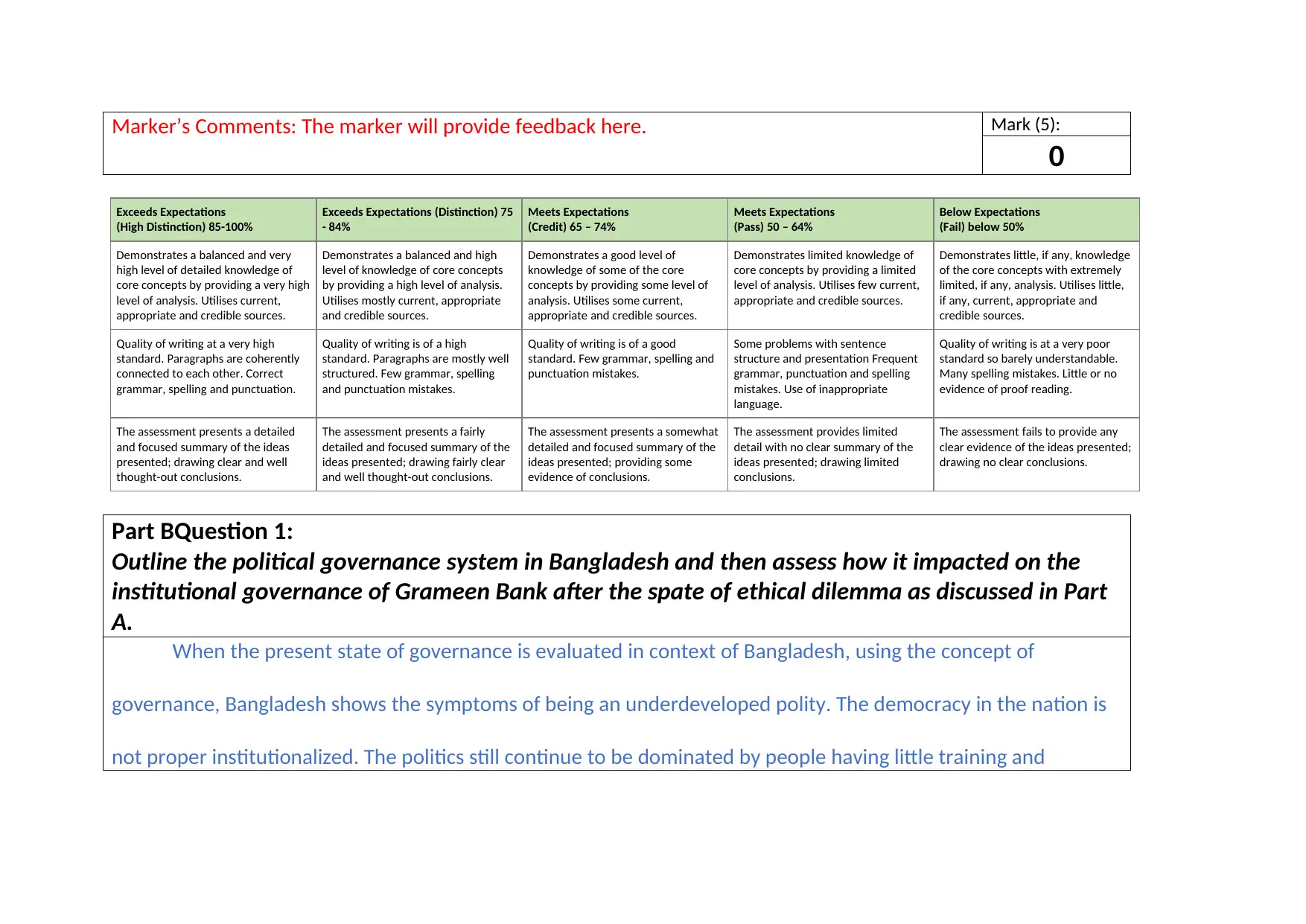
Marker’s Comments: The marker will provide feedback here. Mark (5):
0
Exceeds Expectations
(High Distinction) 85-100%
Exceeds Expectations (Distinction) 75
- 84%
Meets Expectations
(Credit) 65 – 74%
Meets Expectations
(Pass) 50 – 64%
Below Expectations
(Fail) below 50%
Demonstrates a balanced and very
high level of detailed knowledge of
core concepts by providing a very high
level of analysis. Utilises current,
appropriate and credible sources.
Demonstrates a balanced and high
level of knowledge of core concepts
by providing a high level of analysis.
Utilises mostly current, appropriate
and credible sources.
Demonstrates a good level of
knowledge of some of the core
concepts by providing some level of
analysis. Utilises some current,
appropriate and credible sources.
Demonstrates limited knowledge of
core concepts by providing a limited
level of analysis. Utilises few current,
appropriate and credible sources.
Demonstrates little, if any, knowledge
of the core concepts with extremely
limited, if any, analysis. Utilises little,
if any, current, appropriate and
credible sources.
Quality of writing at a very high
standard. Paragraphs are coherently
connected to each other. Correct
grammar, spelling and punctuation.
Quality of writing is of a high
standard. Paragraphs are mostly well
structured. Few grammar, spelling
and punctuation mistakes.
Quality of writing is of a good
standard. Few grammar, spelling and
punctuation mistakes.
Some problems with sentence
structure and presentation Frequent
grammar, punctuation and spelling
mistakes. Use of inappropriate
language.
Quality of writing is at a very poor
standard so barely understandable.
Many spelling mistakes. Little or no
evidence of proof reading.
The assessment presents a detailed
and focused summary of the ideas
presented; drawing clear and well
thought-out conclusions.
The assessment presents a fairly
detailed and focused summary of the
ideas presented; drawing fairly clear
and well thought-out conclusions.
The assessment presents a somewhat
detailed and focused summary of the
ideas presented; providing some
evidence of conclusions.
The assessment provides limited
detail with no clear summary of the
ideas presented; drawing limited
conclusions.
The assessment fails to provide any
clear evidence of the ideas presented;
drawing no clear conclusions.
Part BQuestion 1:
Outline the political governance system in Bangladesh and then assess how it impacted on the
institutional governance of Grameen Bank after the spate of ethical dilemma as discussed in Part
A.
When the present state of governance is evaluated in context of Bangladesh, using the concept of
governance, Bangladesh shows the symptoms of being an underdeveloped polity. The democracy in the nation is
not proper institutionalized. The politics still continue to be dominated by people having little training and
0
Exceeds Expectations
(High Distinction) 85-100%
Exceeds Expectations (Distinction) 75
- 84%
Meets Expectations
(Credit) 65 – 74%
Meets Expectations
(Pass) 50 – 64%
Below Expectations
(Fail) below 50%
Demonstrates a balanced and very
high level of detailed knowledge of
core concepts by providing a very high
level of analysis. Utilises current,
appropriate and credible sources.
Demonstrates a balanced and high
level of knowledge of core concepts
by providing a high level of analysis.
Utilises mostly current, appropriate
and credible sources.
Demonstrates a good level of
knowledge of some of the core
concepts by providing some level of
analysis. Utilises some current,
appropriate and credible sources.
Demonstrates limited knowledge of
core concepts by providing a limited
level of analysis. Utilises few current,
appropriate and credible sources.
Demonstrates little, if any, knowledge
of the core concepts with extremely
limited, if any, analysis. Utilises little,
if any, current, appropriate and
credible sources.
Quality of writing at a very high
standard. Paragraphs are coherently
connected to each other. Correct
grammar, spelling and punctuation.
Quality of writing is of a high
standard. Paragraphs are mostly well
structured. Few grammar, spelling
and punctuation mistakes.
Quality of writing is of a good
standard. Few grammar, spelling and
punctuation mistakes.
Some problems with sentence
structure and presentation Frequent
grammar, punctuation and spelling
mistakes. Use of inappropriate
language.
Quality of writing is at a very poor
standard so barely understandable.
Many spelling mistakes. Little or no
evidence of proof reading.
The assessment presents a detailed
and focused summary of the ideas
presented; drawing clear and well
thought-out conclusions.
The assessment presents a fairly
detailed and focused summary of the
ideas presented; drawing fairly clear
and well thought-out conclusions.
The assessment presents a somewhat
detailed and focused summary of the
ideas presented; providing some
evidence of conclusions.
The assessment provides limited
detail with no clear summary of the
ideas presented; drawing limited
conclusions.
The assessment fails to provide any
clear evidence of the ideas presented;
drawing no clear conclusions.
Part BQuestion 1:
Outline the political governance system in Bangladesh and then assess how it impacted on the
institutional governance of Grameen Bank after the spate of ethical dilemma as discussed in Part
A.
When the present state of governance is evaluated in context of Bangladesh, using the concept of
governance, Bangladesh shows the symptoms of being an underdeveloped polity. The democracy in the nation is
not proper institutionalized. The politics still continue to be dominated by people having little training and
⊘ This is a preview!⊘
Do you want full access?
Subscribe today to unlock all pages.

Trusted by 1+ million students worldwide
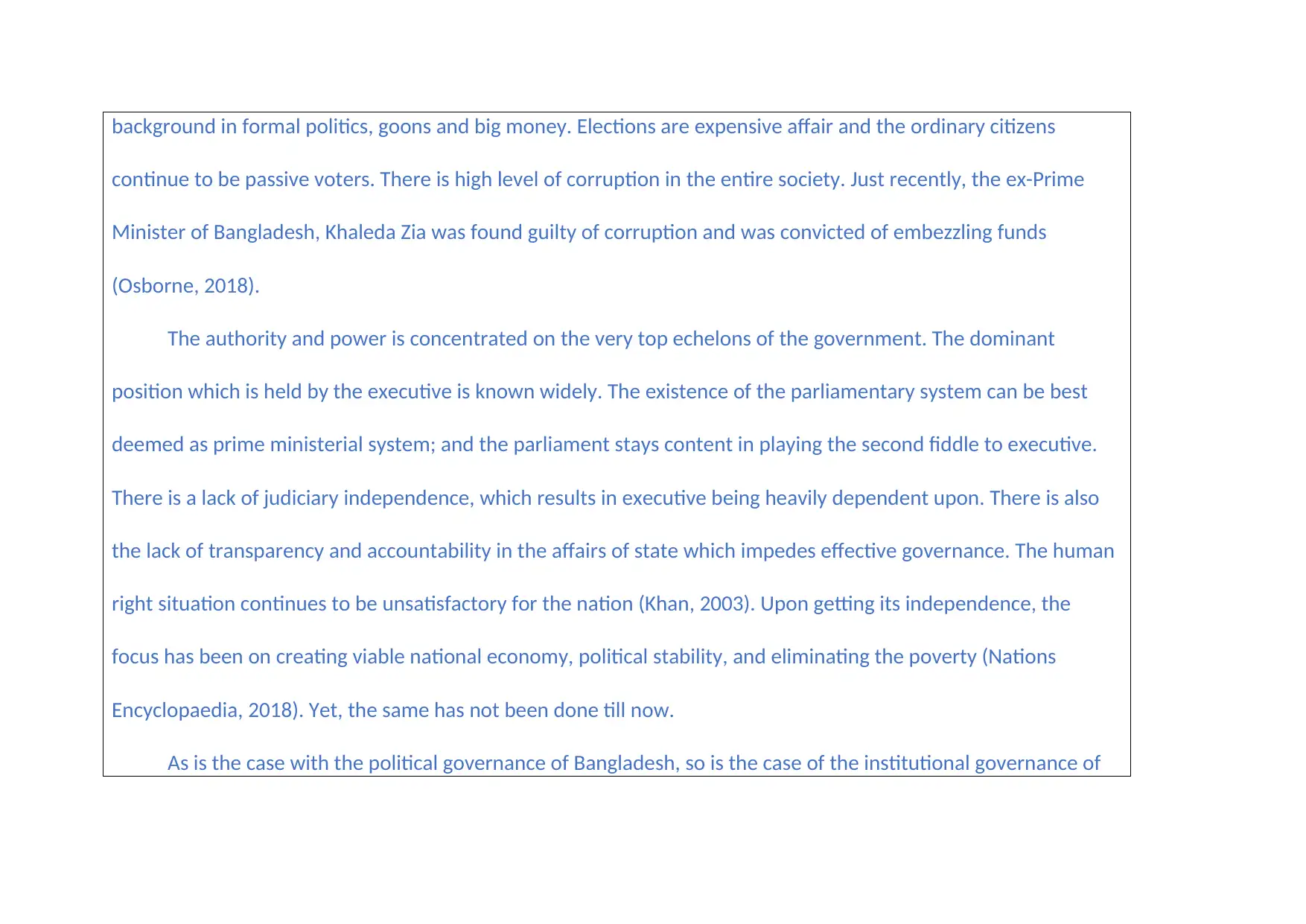
background in formal politics, goons and big money. Elections are expensive affair and the ordinary citizens
continue to be passive voters. There is high level of corruption in the entire society. Just recently, the ex-Prime
Minister of Bangladesh, Khaleda Zia was found guilty of corruption and was convicted of embezzling funds
(Osborne, 2018).
The authority and power is concentrated on the very top echelons of the government. The dominant
position which is held by the executive is known widely. The existence of the parliamentary system can be best
deemed as prime ministerial system; and the parliament stays content in playing the second fiddle to executive.
There is a lack of judiciary independence, which results in executive being heavily dependent upon. There is also
the lack of transparency and accountability in the affairs of state which impedes effective governance. The human
right situation continues to be unsatisfactory for the nation (Khan, 2003). Upon getting its independence, the
focus has been on creating viable national economy, political stability, and eliminating the poverty (Nations
Encyclopaedia, 2018). Yet, the same has not been done till now.
As is the case with the political governance of Bangladesh, so is the case of the institutional governance of
continue to be passive voters. There is high level of corruption in the entire society. Just recently, the ex-Prime
Minister of Bangladesh, Khaleda Zia was found guilty of corruption and was convicted of embezzling funds
(Osborne, 2018).
The authority and power is concentrated on the very top echelons of the government. The dominant
position which is held by the executive is known widely. The existence of the parliamentary system can be best
deemed as prime ministerial system; and the parliament stays content in playing the second fiddle to executive.
There is a lack of judiciary independence, which results in executive being heavily dependent upon. There is also
the lack of transparency and accountability in the affairs of state which impedes effective governance. The human
right situation continues to be unsatisfactory for the nation (Khan, 2003). Upon getting its independence, the
focus has been on creating viable national economy, political stability, and eliminating the poverty (Nations
Encyclopaedia, 2018). Yet, the same has not been done till now.
As is the case with the political governance of Bangladesh, so is the case of the institutional governance of
Paraphrase This Document
Need a fresh take? Get an instant paraphrase of this document with our AI Paraphraser
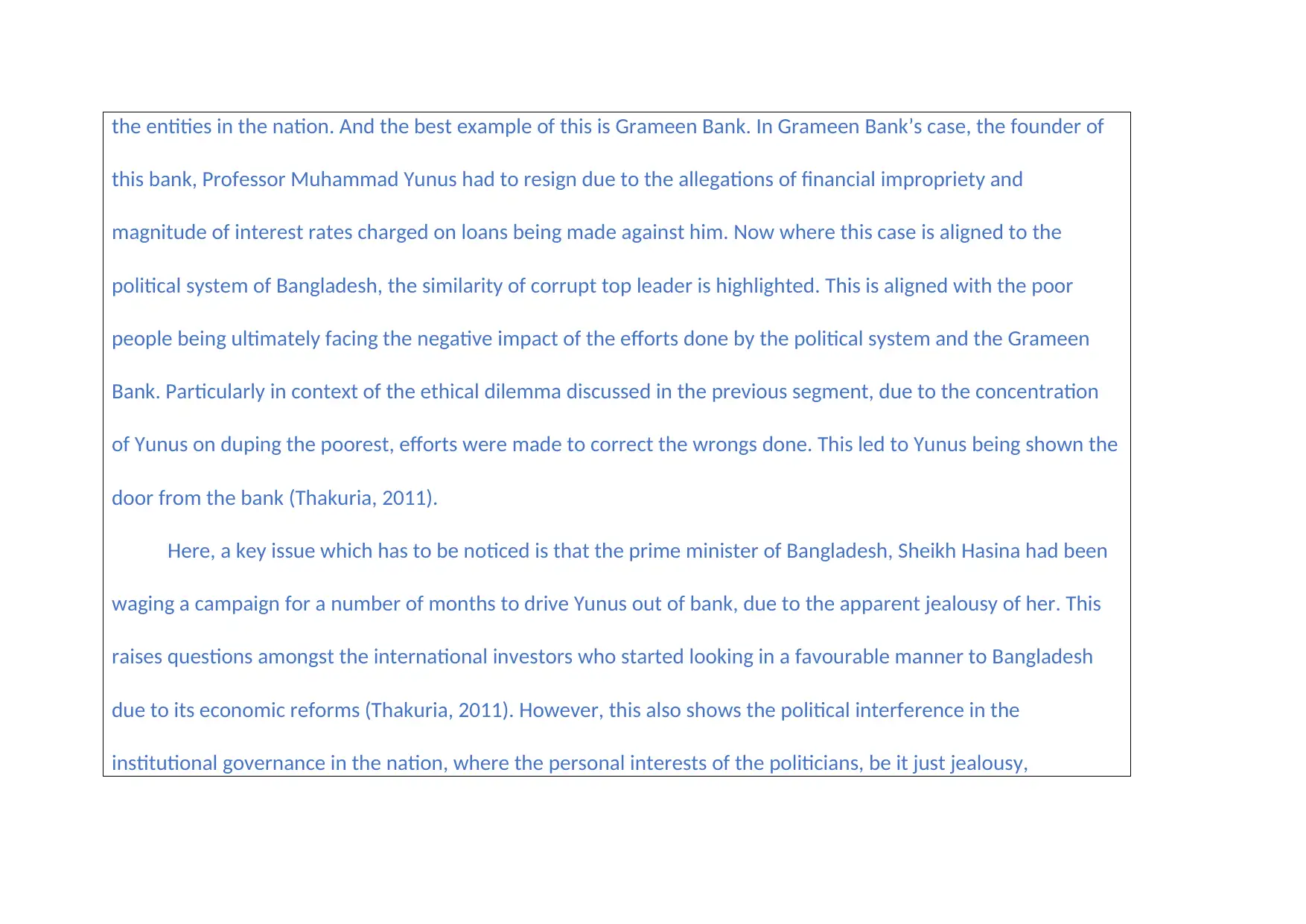
the entities in the nation. And the best example of this is Grameen Bank. In Grameen Bank’s case, the founder of
this bank, Professor Muhammad Yunus had to resign due to the allegations of financial impropriety and
magnitude of interest rates charged on loans being made against him. Now where this case is aligned to the
political system of Bangladesh, the similarity of corrupt top leader is highlighted. This is aligned with the poor
people being ultimately facing the negative impact of the efforts done by the political system and the Grameen
Bank. Particularly in context of the ethical dilemma discussed in the previous segment, due to the concentration
of Yunus on duping the poorest, efforts were made to correct the wrongs done. This led to Yunus being shown the
door from the bank (Thakuria, 2011).
Here, a key issue which has to be noticed is that the prime minister of Bangladesh, Sheikh Hasina had been
waging a campaign for a number of months to drive Yunus out of bank, due to the apparent jealousy of her. This
raises questions amongst the international investors who started looking in a favourable manner to Bangladesh
due to its economic reforms (Thakuria, 2011). However, this also shows the political interference in the
institutional governance in the nation, where the personal interests of the politicians, be it just jealousy,
this bank, Professor Muhammad Yunus had to resign due to the allegations of financial impropriety and
magnitude of interest rates charged on loans being made against him. Now where this case is aligned to the
political system of Bangladesh, the similarity of corrupt top leader is highlighted. This is aligned with the poor
people being ultimately facing the negative impact of the efforts done by the political system and the Grameen
Bank. Particularly in context of the ethical dilemma discussed in the previous segment, due to the concentration
of Yunus on duping the poorest, efforts were made to correct the wrongs done. This led to Yunus being shown the
door from the bank (Thakuria, 2011).
Here, a key issue which has to be noticed is that the prime minister of Bangladesh, Sheikh Hasina had been
waging a campaign for a number of months to drive Yunus out of bank, due to the apparent jealousy of her. This
raises questions amongst the international investors who started looking in a favourable manner to Bangladesh
due to its economic reforms (Thakuria, 2011). However, this also shows the political interference in the
institutional governance in the nation, where the personal interests of the politicians, be it just jealousy,
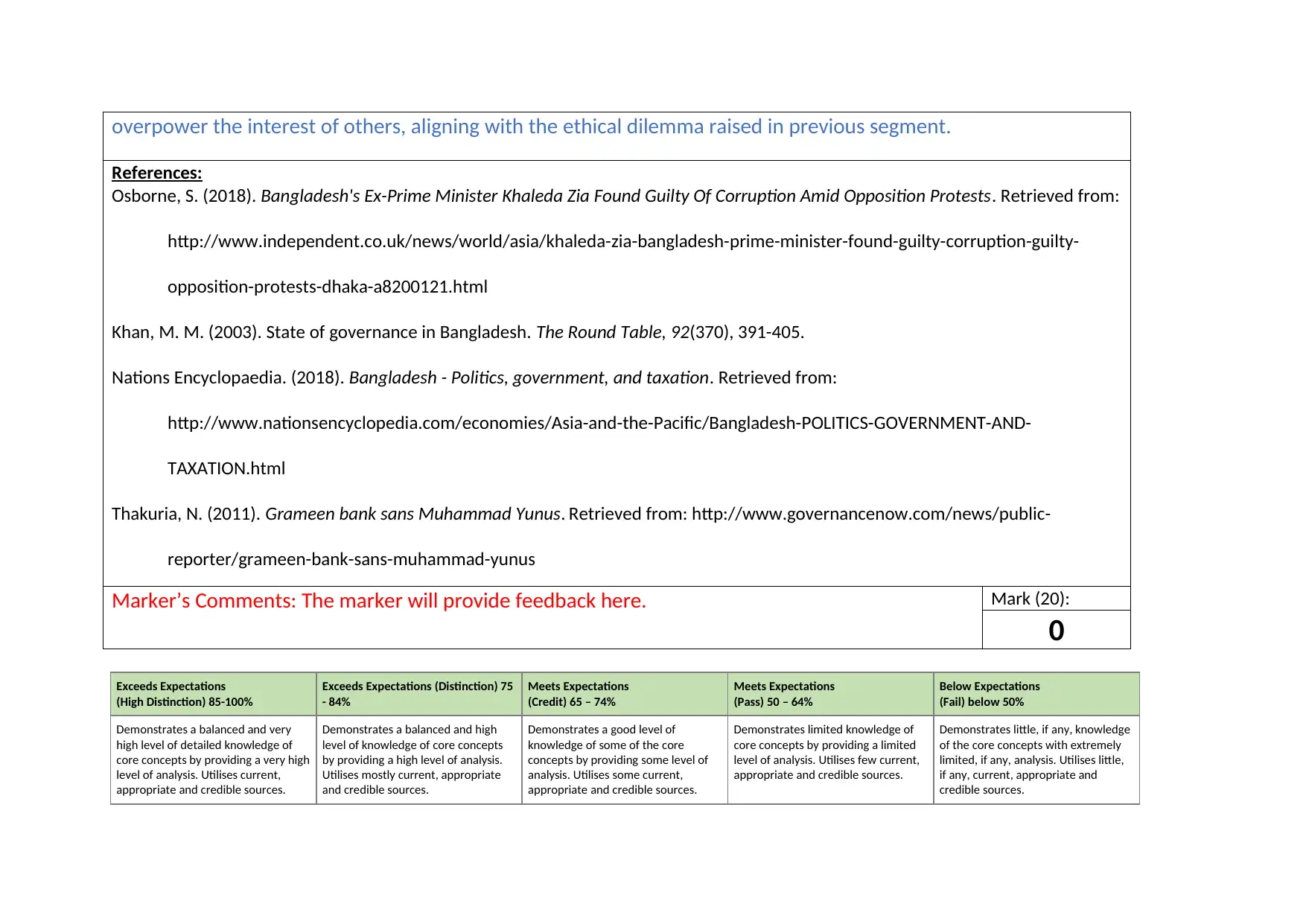
overpower the interest of others, aligning with the ethical dilemma raised in previous segment.
References:
Osborne, S. (2018). Bangladesh's Ex-Prime Minister Khaleda Zia Found Guilty Of Corruption Amid Opposition Protests. Retrieved from:
http://www.independent.co.uk/news/world/asia/khaleda-zia-bangladesh-prime-minister-found-guilty-corruption-guilty-
opposition-protests-dhaka-a8200121.html
Khan, M. M. (2003). State of governance in Bangladesh. The Round Table, 92(370), 391-405.
Nations Encyclopaedia. (2018). Bangladesh - Politics, government, and taxation. Retrieved from:
http://www.nationsencyclopedia.com/economies/Asia-and-the-Pacific/Bangladesh-POLITICS-GOVERNMENT-AND-
TAXATION.html
Thakuria, N. (2011). Grameen bank sans Muhammad Yunus. Retrieved from: http://www.governancenow.com/news/public-
reporter/grameen-bank-sans-muhammad-yunus
Marker’s Comments: The marker will provide feedback here. Mark (20):
0
Exceeds Expectations
(High Distinction) 85-100%
Exceeds Expectations (Distinction) 75
- 84%
Meets Expectations
(Credit) 65 – 74%
Meets Expectations
(Pass) 50 – 64%
Below Expectations
(Fail) below 50%
Demonstrates a balanced and very
high level of detailed knowledge of
core concepts by providing a very high
level of analysis. Utilises current,
appropriate and credible sources.
Demonstrates a balanced and high
level of knowledge of core concepts
by providing a high level of analysis.
Utilises mostly current, appropriate
and credible sources.
Demonstrates a good level of
knowledge of some of the core
concepts by providing some level of
analysis. Utilises some current,
appropriate and credible sources.
Demonstrates limited knowledge of
core concepts by providing a limited
level of analysis. Utilises few current,
appropriate and credible sources.
Demonstrates little, if any, knowledge
of the core concepts with extremely
limited, if any, analysis. Utilises little,
if any, current, appropriate and
credible sources.
References:
Osborne, S. (2018). Bangladesh's Ex-Prime Minister Khaleda Zia Found Guilty Of Corruption Amid Opposition Protests. Retrieved from:
http://www.independent.co.uk/news/world/asia/khaleda-zia-bangladesh-prime-minister-found-guilty-corruption-guilty-
opposition-protests-dhaka-a8200121.html
Khan, M. M. (2003). State of governance in Bangladesh. The Round Table, 92(370), 391-405.
Nations Encyclopaedia. (2018). Bangladesh - Politics, government, and taxation. Retrieved from:
http://www.nationsencyclopedia.com/economies/Asia-and-the-Pacific/Bangladesh-POLITICS-GOVERNMENT-AND-
TAXATION.html
Thakuria, N. (2011). Grameen bank sans Muhammad Yunus. Retrieved from: http://www.governancenow.com/news/public-
reporter/grameen-bank-sans-muhammad-yunus
Marker’s Comments: The marker will provide feedback here. Mark (20):
0
Exceeds Expectations
(High Distinction) 85-100%
Exceeds Expectations (Distinction) 75
- 84%
Meets Expectations
(Credit) 65 – 74%
Meets Expectations
(Pass) 50 – 64%
Below Expectations
(Fail) below 50%
Demonstrates a balanced and very
high level of detailed knowledge of
core concepts by providing a very high
level of analysis. Utilises current,
appropriate and credible sources.
Demonstrates a balanced and high
level of knowledge of core concepts
by providing a high level of analysis.
Utilises mostly current, appropriate
and credible sources.
Demonstrates a good level of
knowledge of some of the core
concepts by providing some level of
analysis. Utilises some current,
appropriate and credible sources.
Demonstrates limited knowledge of
core concepts by providing a limited
level of analysis. Utilises few current,
appropriate and credible sources.
Demonstrates little, if any, knowledge
of the core concepts with extremely
limited, if any, analysis. Utilises little,
if any, current, appropriate and
credible sources.
⊘ This is a preview!⊘
Do you want full access?
Subscribe today to unlock all pages.

Trusted by 1+ million students worldwide
1 out of 15
Related Documents
Your All-in-One AI-Powered Toolkit for Academic Success.
+13062052269
info@desklib.com
Available 24*7 on WhatsApp / Email
![[object Object]](/_next/static/media/star-bottom.7253800d.svg)
Unlock your academic potential
Copyright © 2020–2026 A2Z Services. All Rights Reserved. Developed and managed by ZUCOL.




